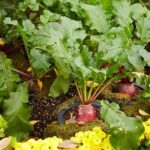Are you wondering how to protect vegetable gardens from possums? Possums can wreak havoc on your garden, but with the right knowledge and tools, you can effectively keep them at bay. In this article, we will explore the behavior and habits of possums in garden settings, the damage they can cause to vegetable gardens, and various natural deterrents and barriers that can be implemented to protect your precious produce.
Possums are notorious for their penchant for feasting on fruits, vegetables, and flowers. Their nocturnal nature makes them difficult to spot but their presence is often revealed through the damage they leave behind in the garden. Understanding their behavior and habits is crucial in order to effectively protect your vegetable garden from these furry intruders.
Throughout this article, we will delve into the various methods available for deterring possums from your garden. From natural repellents and barriers to using predator urine and motion-activated sprinklers, there are numerous strategies that can be employed to keep possums away from your beloved crops. By implementing these methods, you can ensure a bountiful harvest while promoting a harmonious coexistence with wildlife in your garden.
Identifying Possum Behavior and Habits in Garden Settings
Possums are nocturnal creatures that can wreak havoc on vegetable gardens, particularly in suburban and rural areas. Identifying their behavior and habits in garden settings is crucial to finding effective methods for keeping them at bay. Possums are known for their love of fruits and vegetables, making gardens an attractive target. They are also skilled climbers, able to access areas that might otherwise seem out of reach.
One common behavior of possums in garden settings is their tendency to forage for food during the night. This often results in damaged or destroyed crops, as well as upturned soil from their digging. Additionally, possums have a strong sense of smell and will be drawn to any food source, particularly those with a strong aroma.
Another key habit of possums in the garden is their preference for sheltered areas during the day. This can include dense foliage, woodpiles, or even human structures like sheds or garages. Understanding where possums may seek refuge during daylight hours can help in creating effective deterrents to keep them away from vegetable gardens.
| Possum Behavior | Garden Habits |
|---|---|
| Nocturnal foraging | Damaged crops and upturned soil |
| Preference for sheltered areas | Seeking refuge in dense foliage or human structures |
Damage Caused by Possums to Vegetable Gardens
Possums can cause significant damage to vegetable gardens, making it essential for gardeners to understand the impact of these creatures on their crops. One of the most common types of damage caused by possums is the consumption of fruits and vegetables. They are known to eat a wide variety of produce, including tomatoes, strawberries, beans, and corn. Additionally, possums can also cause destruction by trampling on plants and digging up bulbs or seedlings.
According to the University of California Integrated Pest Management Program, possums are also carriers of various diseases such as tuberculosis and spotted fever. Their feces can contaminate soil and water sources, posing a health risk to both humans and pets. As such, it becomes crucial to protect vegetable gardens from possums not only for the preservation of crops but also for public health reasons.
In order to understand how to protect vegetable gardens from possums, it is important for gardeners to be aware of the specific methods that these animals employ when foraging for food. Possums are nocturnal creatures that tend to be most active during the night when they go in search of food. Identifying their habits and behavior can help gardeners develop effective strategies for keeping them at bay.
| Damage Caused by Possums | Vulnerable Vegetables |
|---|---|
| Eating fruits and vegetables | Tomatoes, strawberries, beans, corn |
| Trampling on plants | All types of plants |
| Spreading Disease | Risking tuberculosis and spotted fever among others. |
Natural Deterrents and Repellents for Possums
Possums can be a nuisance in vegetable gardens, but there are natural deterrents and repellents that can help keep them at bay. These methods are not only effective but also environmentally friendly, promoting a harmonious coexistence with wildlife in the garden.
Strong Scents
One way to deter possums from entering your vegetable garden is by using strong scents that they find unpleasant. Substances such as garlic, onions, chili peppers, or predator urine can be strategically placed around the garden to create a barrier that possums will want to avoid. Additionally, planting fragrant herbs like lavender and mint along the perimeter of the garden can help repel possums due to their strong odors.
Natural Repellent Sprays
Another effective method is to use natural repellent sprays made from ingredients such as vinegar, ammonia, or citrus peels. These can be sprayed onto plants or around the garden to create an unpleasant environment for possums. Alternatively, commercial repellent sprays made from essential oils like peppermint or clove can also be used as a non-toxic way to keep possums away from your vegetables.
Ultrasonic Devices
Ultrasonic devices emit high-frequency sound waves that are unpleasant for possums but harmless to other wildlife and pets. These devices can be placed around the garden and are activated when they detect movement, effectively deterring possums without causing them any harm. Ultrasonic devices offer a low-maintenance and humane solution for keeping possums out of your vegetable garden, ensuring a peaceful coexistence with wildlife.
Hardware Cloth and Fencing as Effective Barriers
When it comes to protecting your vegetable garden from possums, using hardware cloth and fencing can be an effective barrier. These physical barriers create a boundary that possums are less likely to breach, keeping your precious crops safe from their destructive habits. Here are some options for utilizing hardware cloth and fencing as a way to keep possums out of your garden:
- Install a fence around the perimeter of your garden that is at least 4 feet high.
- Use hardware cloth with a mesh size no larger than 1 inch to create a barrier that possums cannot squeeze through or climb over.
- Bury the bottom of the fence or hardware cloth at least 12 inches deep to prevent possums from digging under it.
These barriers not only protect your vegetable garden from possums but also serve as a deterrent for other wildlife such as rabbits and deer. By implementing these physical barriers, you can enjoy a bountiful harvest without worrying about damage caused by possums.
In addition to protecting your garden, using hardware cloth and fencing promotes harmony with wildlife by providing them with their own territory while safeguarding your vegetable plants. By creating physical barriers, you can maintain a healthy ecosystem in your garden while keeping destructive possums at bay.
Using Predator Urine and Decoys to Keep Possums at Bay
Possums are notorious for invading vegetable gardens and causing damage to crops, making it essential for gardeners to find effective ways to keep them at bay. One natural method that has been found to be effective is using predator urine and decoys. Here are some tips on how to use these methods to deter possums from your vegetable garden:
- Predator Urine: Many garden supply stores carry products containing the scent of predators such as foxes, coyotes, or even wolves. When possums catch whiff of these scents, they are likely to steer clear of the area.
- Decoys: Another option is to strategically place decoys of natural predators around your garden. Owls and snakes are known enemies of possums, and by placing lifelike decoys of these creatures in your garden, you can create the illusion that there is a predator present and discourage possums from entering the area.
It’s important to rotate the placement of both predator urine and decoys in your garden every few days, as possums may eventually become accustomed to their presence if they remain in the same location for too long.
In addition to using predator urine and decoys, it’s also beneficial to remove any potential food sources that might attract possums. This includes cleaning up fallen fruits and vegetables, securing compost piles, and ensuring that garbage cans are tightly sealed. By implementing these strategies along with using predator urine and decoys, you can effectively decrease the likelihood of possums invading your vegetable garden.
Creating a Physical Barrier With Netting or Bird Mesh
One effective method for protecting vegetable gardens from possums is to create a physical barrier using netting or bird mesh. These barriers can serve as an obstacle that prevents possums from accessing and damaging your plants. By understanding how to properly install and utilize netting or bird mesh, gardeners can effectively keep possums at bay without causing harm to the animals.
Choosing the Right Material
When selecting netting or bird mesh, it is important to choose a material that is sturdy and durable. Look for options that are specifically designed for garden use and can withstand outdoor elements. The size of the mesh should be small enough to prevent possums from squeezing through, but still allow sunlight, air, and water to reach your plants.
Proper Installation Techniques
To maximize the effectiveness of netting or bird mesh as a barrier against possums, it must be installed properly. Ensure that the entire garden area is covered with the material, including all sides and even overhead if necessary. Use stakes or supports to secure the netting in place, making sure there are no gaps or openings where possums could gain access.
Maintaining and Inspecting Regularly
Regular maintenance and inspection of the netting or bird mesh is crucial in keeping possums out of your vegetable garden. Check for any tears, holes, or loose areas that could potentially allow possums to penetrate the barrier. Make repairs as needed and make adjustments if any part of the barrier has been compromised. A well-maintained physical barrier can significantly reduce the risk of possum damage to your precious plants.
Implementing Motion-Activated Sprinklers as a Humane Deterrent
If you are looking for a humane way to deter possums from your vegetable garden, consider implementing motion-activated sprinklers. These devices work by detecting motion and then spraying a burst of water, startling the possum and encouraging it to leave the area. Not only are motion-activated sprinklers effective at deterring possums, but they also help to keep other unwanted garden pests at bay.
One of the advantages of using motion-activated sprinklers is that they provide a non-lethal and environmentally friendly solution for keeping possums away from your vegetable garden. By using water as a deterrent, you can effectively protect your crops without causing harm to the possum or disrupting the natural balance of your garden ecosystem. Additionally, motion-activated sprinklers are easy to install and require minimal maintenance, making them a convenient option for gardeners.
When setting up motion-activated sprinklers in your vegetable garden, be sure to strategically place them in areas where possums are likely to enter or frequent. This may include entry points such as gates or areas near fences where possums can easily access your garden. By creating a barrier with a network of these sprinklers, you can create an effective deterrent system that will discourage possums from entering and damaging your precious crops.
Tips for Maintaining a Possum-Free Vegetable Garden
Once you have implemented natural deterrents, barriers, and humane deterrents to keep possums away from your vegetable garden, it is important to maintain these measures to ensure a possum-free environment. Regularly inspecting and reinforcing the barriers such as hardware cloth and fencing is essential to prevent possums from finding new entry points. Check for any signs of damage or wear and tear, and promptly address any issues to maintain the effectiveness of these barriers.
In addition to physical barriers, it is also important to consistently replenish and reapply natural deterrents and repellents. For example, if you are using predator urine or decoys as a method of keeping possums at bay, make sure to regularly reapply these products as directed. This will help reinforce the notion that your garden is not a welcoming environment for possums.
Furthermore, implementing motion-activated sprinklers as a humane deterrent requires regular maintenance to ensure they are functioning properly. Check the batteries or power source regularly, adjust the sensitivity settings as needed, and position them strategically in your garden for optimal coverage. By maintaining these deterrents and repellents, you can effectively protect your vegetable garden from possums while promoting a harmonious coexistence with wildlife in your garden.
Conclusion
In conclusion, while possums can pose a threat to vegetable gardens, there are several effective methods for protecting your plants without causing harm to these wild animals. By understanding the behavior and habits of possums in garden settings, gardeners can implement natural deterrents and repellents, as well as physical barriers such as hardware cloth and fencing. Additionally, the use of predator urine, decoys, netting, bird mesh, and motion-activated sprinklers can all contribute to keeping possums at bay.
It’s important to remember that maintaining a possum-free vegetable garden is not about completely eradicating these animals from their natural habitat. Rather, it’s about finding ways to coexist with wildlife while protecting our crops. By implementing these strategies for deterring possums from our gardens, we can promote a harmonious relationship with the natural world around us.
In the end, taking steps to protect vegetable gardens from possums allows us to enjoy the beauty and bounty of our gardens while respecting the balance of nature. With a combination of preventive measures and humane deterrents in place, we can create a safe space for both our plants and the wildlife that calls our gardens home.
Frequently Asked Questions
How Do I Keep Possums Out of My Vegetable Garden?
To keep possums out of your vegetable garden, you can start by securing the perimeter with a sturdy fence at least 4 feet tall. Make sure the bottom of the fence is buried or bent outward to prevent digging.
Additionally, eliminate any potential food sources like fallen fruits or vegetables, and keep trash cans tightly sealed. You can also try using natural repellents like ammonia-soaked rags or predator urine around the garden.
Do Opossums Damage Vegetable Gardens?
Opossums can indeed cause damage to vegetable gardens by eating crops and digging for insects. They are particularly fond of fruits, berries, and vegetables like corn, tomatoes, and lettuce. Their presence can lead to significant loss if left unaddressed.
What Is the Best Natural Deterrent for Possums?
The best natural deterrent for possums includes using strong scents to repel them. Substances like garlic, cloves, peppermint oil, or vinegar can be effective repellents when spread around the garden perimeter or on plants themselves. Other natural remedies include planting strong-smelling plants like marigolds or using motion-activated sprinklers to startle them away from your garden area.

If you’re looking to get into vegetable gardening, or are just looking for some tips on how to make your current garden better, then you’ve come to the right place! My name is Ethel and I have been gardening for years. In this blog, I’m going to share with you some of my best tips on how to create a successful vegetable garden.





